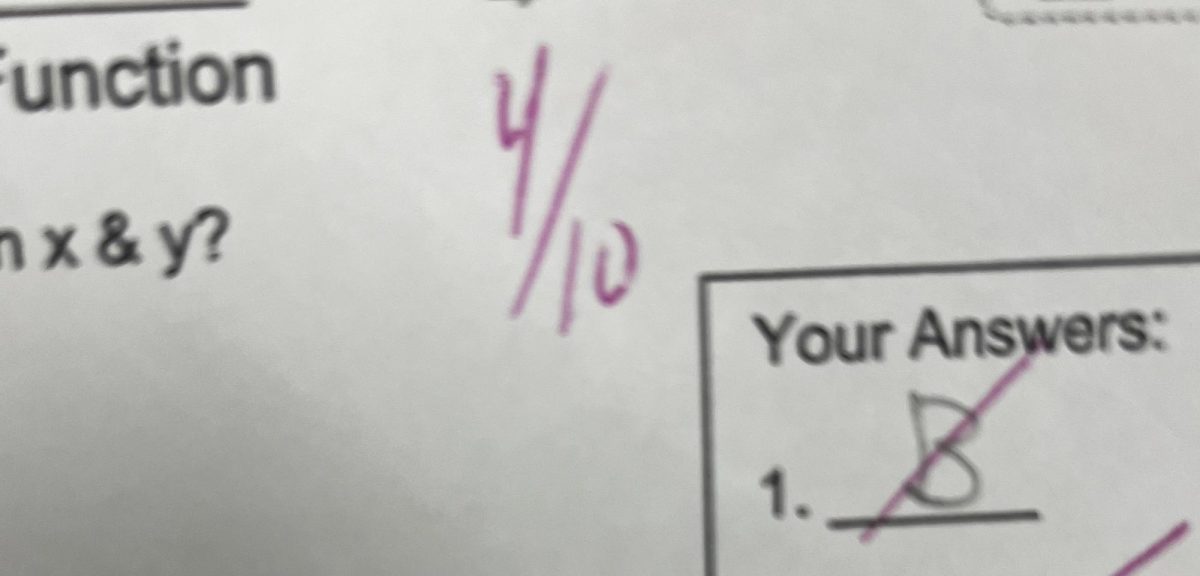COVID-19 took a toll on all of us. That’s no secret, but even after two full years, we still are suffering from it. It took away our work ethics and gave us phone addictions. Most of us now have to rely on phones for basic math questions to get us through that one class we hate. COVID isn’t the only one to blame though. School policymakers are coddling us and loosening up on restrictions, leaving students to be further back academically than we have been in decades.
In 2020, at the heart of COVID when nearly no students were in a physical school, there was a spike in advanced math test scores. This could be due to several reasons. Whether some students do better academically at home or because of cheating is unclear. When students are around technology that gives them access to the internet and information 24/7, they are bound to use it. This leads to students not trying as hard, which could lead to students not caring about school.
When talking with people about the impact of COVID-19 on grades, Mr. Irvine said: “All of our students are behind in reading, writing, and math.”
In the 2022-2023 school year, Norristown Area School District only had a 17.9% average for getting proficient or advanced in state assessments for math; compared to the statewide average of 38.3%. It’s unacceptable. The days of working remotely are long gone, yet students are still doing so poorly. While other schools slowly recovered their grades after COVID, Norristown Area High School did not, and has worsened yearly with no signs of stopping. Understandably, the administration tried to baby us at first when we were in and out of COVID because we had been affected by the sudden changes. But now that the grades haven’t been improving they need to make changes.
Social Studies teacher, Michael Santangelo, agrees with this approach, stating: “I would like to see stronger policies… that don’t allow as much free use of technology”.
While the state assessment scores may seem like a hurdle too big to overcome, there are multiple ways this can begin to be addressed. One such option is stricter policies on phone usage. This option is backed by research that shows phone usage negatively impacts student grades. The paper goes on to say that the impact on grades is doubled when phone usage occurs in the classroom. For every 100 minutes students spend on their phones, they would drop around 12.6 places in terms of their academic school ranking.
Currently, little is being done to stop students from using their phones in class. School policies have been more permissive to “solve” the grade issue when it needs to become stricter. Teachers have said that there has been nothing done to truly help improve this issue at all and that they can’t compete with the constant phone usage.
“It’s a policy thing,” said Mr. Irvine. “I feel like the school is trying to be compassionate with students situation that a lot of kids are behind and they’re still trying to catch up… Students are not being as proactive and disciplined.”
Phones pose a major threat to students now. They are constantly in our lives, always notifying us of drama and getting us distracted from our work.
School administration needs to make stricter rules if it wants the grades to go back up. The vast majority of students are completely capable of getting A’s and B’s in their classes, but many of them cannot resist the urge to go on TikTok for “just a few minutes” or “check Insta real quick” and then do it for the next 30 minutes. These students aren’t going to magically develop self-discipline on their own and stay off their phones forever. They need to lose their connection to their phone by staying off of it and focusing on their work. If policymakers would make rules to keep students from going on their phones, then they would do much better in their classes. Too many students have become distracted in schools because of these relaxed policies.
“We have become too comfortable,” says Mr. Irvine.
It’s so easy to just bring a phone and stare at it all day, not paying attention to a word the teacher says, which can be deflating for the teachers. For the most part, if students try to put in the effort and do the work, they will not receive low grades. Teachers simply cannot spend all their time scolding kids for having their phones out because they wouldn’t have time to teach. The only way to solve this problem is to get rid of phones.
This is a hard pill to swallow. Having better grades in high school is important for so many things later on in life. Better colleges, better scholarships, better career opportunities, and the list goes on. We as students need to push to get back on track with other schools for our future.














Jasper • May 15, 2024 at 11:01 am
severe phone usage in teens doesn’t just affect our grades, but our mental health as well. When you spend roughly 6 hours (the average time on student’s phone usage reports that I’ve seen) on your phone, that’s 6 hours you could have spent doing something else. You’re less productive throughout the day which is bound to one day translate into your everyday life as an adult, the lack of self-discipline today will only grow stronger as you age reinforcing habits.